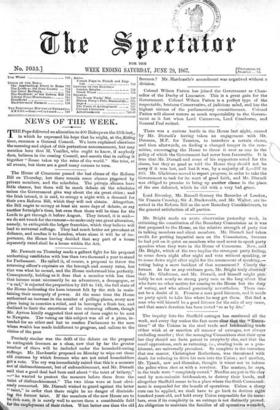Mr. Bright made an acute observation yesterday week, in criticizing
the constitution of the Boundary Commission as it was first proposed to the House, on the relative strength of party ties in talking members and silent members. Mr. Disraeli had taken credit for putting impartial men on the Commission, because he had put on it quiet ex-members who used never to speak party speeches when they were in the House of Commons. Now, said Mr. Bright, which of the two implies the strongest party feeling, to come down night after night and vote without speaking, or to come down night after night for the amusement of speaking,— voting being a mere incident of that amusement ? Clearly the former. As far as any evidence goes, Mr. Bright truly obseriea' that Mr. Gladstone, and Mr. Disraeli, and himself might 'ride' bably be not nearly so strong party men as the long silent files- who have no other motive for coming to the House but the duty of voting, and who attend punctually nevertheless. There can- not be a doubt of it. Promise a man good listeners, and it needs no party spirit to take him where he may get them. But find a man who will himself be a good listener for the Bake of any cause, and that man's devotion has been tested so as by fire.'






























